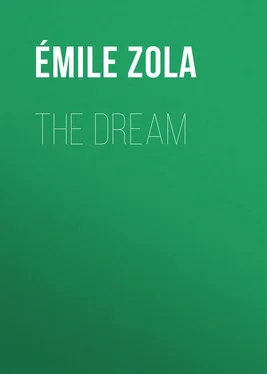Émile Zola - The Dream
Здесь есть возможность читать онлайн «Émile Zola - The Dream» — ознакомительный отрывок электронной книги совершенно бесплатно, а после прочтения отрывка купить полную версию. В некоторых случаях можно слушать аудио, скачать через торрент в формате fb2 и присутствует краткое содержание. Жанр: literature_19, foreign_antique, foreign_prose, на английском языке. Описание произведения, (предисловие) а так же отзывы посетителей доступны на портале библиотеки ЛибКат.
- Название:The Dream
- Автор:
- Жанр:
- Год:неизвестен
- ISBN:нет данных
- Рейтинг книги:3 / 5. Голосов: 1
-
Избранное:Добавить в избранное
- Отзывы:
-
Ваша оценка:
- 60
- 1
- 2
- 3
- 4
- 5
The Dream: краткое содержание, описание и аннотация
Предлагаем к чтению аннотацию, описание, краткое содержание или предисловие (зависит от того, что написал сам автор книги «The Dream»). Если вы не нашли необходимую информацию о книге — напишите в комментариях, мы постараемся отыскать её.
The Dream — читать онлайн ознакомительный отрывок
Ниже представлен текст книги, разбитый по страницам. Система сохранения места последней прочитанной страницы, позволяет с удобством читать онлайн бесплатно книгу «The Dream», без необходимости каждый раз заново искать на чём Вы остановились. Поставьте закладку, и сможете в любой момент перейти на страницу, на которой закончили чтение.
Интервал:
Закладка:
The husband and wife looked at each other for a few moments. In fact, since the autumn they had planned taking as an apprentice some young girl who would live with them, and thus bring a little brightness into their house, which seemed so dull without children. And their decision was soon made.
“Would you like it, my dear?” Hubert asked.
Hubertine replied quietly, in her calm voice: “I would indeed.”
Immediately they occupied themselves with the necessary formalities. The husband went to the Justice of Peace of the northern district of Beaumont, who was cousin to his wife, the only relative with whom she had kept up an acquaintance, and told him all the facts of the case. He took charge of it, wrote to the Hospice of Abandoned Children – where, thanks to the registered number, Angelique was easily recognised – and obtained permission for her to remain as apprentice with the Huberts, who were well known for their honourable position.
The Sub-Inspector of the Hospice, on coming to verify the little book, signed the new contract as witness for Hubert, by which the latter promised to treat the child kindly, to keep her tidy, to send her to school and to church, and to give her a good bed to herself. On the other side, the Administration agreed to pay him all indemnities, and to give the child certain stipulated articles of clothing, as was their custom.
In ten days all was arranged. Angelique slept upstairs in a room under the roof, by the side of the garret, and the windows of which overlooked the garden. She had already taken her first lessons in embroidery. The first Sunday morning after she was in her new home, before going to mass, Hubertine opened before her the old chest in the working-room, where she kept the fine gold thread. She held up the little book, then, placing it in that back part of one of the drawers, said: “Look! I have put it here. I will not hide it, but leave it where you can take it if you ever wish to do so. It is best that you should see it, and remember where it is.”
On entering the church that day, Angelique found herself again under the doorway of Saint Agnes. During the week there had been a partial thaw, then the cold weather had returned to so intense a degree that the snow which had half melted on the statues had congealed itself in large bunches or in icicles. Now, the figures seemed dressed in transparent robes of ice, with lace trimmings like spun glass. Dorothea was holding a torch, the liquid droppings of which fell upon her hands. Cecilia wore a silver crown, in which glistened the most brilliant of pearls. Agatha’s nude chest was protected by a crystal armour. And the scenes in the tympanum, the little virgins in the arches, looked as if they had been there for centuries, behind the glass and jewels of the shrine of a saint. Agnes herself let trail behind her her court mantle, threaded with light and embroidered with stars. Her lamb had a fleece of diamonds, and her palm-branch had become the colour of heaven. The whole door was resplendent in the purity of intense cold.
Angelique recollected the night she had passed there under the protection of these saints. She raised her head and smiled upon them.
CHAPTER II
Beaumont is composed of two villages, completely separated and quite distinct one from the other – Beaumont-l’Eglise, on the hill with its old Cathedral of the twelfth century, its Bishop’s Palace which dates only from the seventeenth century, its inhabitants, scarcely one thousand in number, who are crowded together in an almost stifling way in its narrow streets; and Beaumont-la-Ville, at the foot of the hill, on the banks of the Ligneul, an ancient suburb, which the success of its manufactories of lace and fine cambric has enriched and enlarged to such an extent that it has a population of nearly ten thousand persons, several public squares, and an elegant sub-prefecture built in the modern style. These two divisions, the northern district and the southern district, have thus no longer anything in common except in an administrative way. Although scarcely thirty leagues from Paris, where one can go by rail in two hours, Beaumont-l’Eglise seems to be still immured in its old ramparts, of which, however, only three gates remain. A stationary, peculiar class of people lead there a life similar to that which their ancestors had led from father to son during the past five hundred years.
The Cathedral explains everything, has given birth to and preserved everything. It is the mother, the queen, as it rises in all its majesty in the centre of, and above, the little collection of low houses, which, like shivering birds, are sheltered under her wings of stone. One lives there simply for it, and only by it. There is no movement of business activity, and the little tradesmen only sell the necessities of life, such as are absolutely required to feed, to clothe, and to maintain the church and its clergy; and if occasionally one meets some private individuals, they are merely the last representatives of a scattered crowd of worshippers. The church dominates all; each street is one of its veins; the town has no other breath than its own. On that account, this spirit of another age, this religious torpor from the past, makes the cloistered city which surrounds it redolent with a savoury perfume of peace and of faith.
And in all this mystic place, the house of the Huberts, where Angelique was to live in the future, was the one nearest to the Cathedral, and which clung to it as if in reality it were a part thereof. The permission to build there, between two of the great buttresses, must have been given by some vicar long ago, who was desirous of attaching to himself the ancestors of this line of embroiderers, as master chasuble-makers and furnishers for the Cathedral clergy. On the southern side, the narrow garden was barred by the colossal building; first, the circumference of the side chapels, whose windows overlooked the flower-beds, and then the slender, long nave, that the flying buttresses supported, and afterwards the high roof covered with the sheet lead.
The sun never penetrated to the lower part of this garden, where ivy and box alone grew luxuriantly; yet the eternal shadow there was very soft and pleasant as it fell from the gigantic brow of the apse – a religious shadow, sepulchral and pure, which had a good odour about it. In the greenish half-light of its calm freshness, the two towers let fall only the sound of their chimes. But the entire house kept the quivering therefrom, sealed as it was to these old stones, melted into them and supported by them. It trembled at the least of the ceremonies; at the High Mass, the rumbling of the organ, the voices of the choristers, even the oppressed sighs of the worshippers, murmured through each one of its rooms, lulled it as if with a holy breath from the Invisible, and at times through the half-cool walls seemed to come the vapours from the burning incense.
For five years Angelique lived and grew there, as if in a cloister, far away from the world. She only went out to attend the seven-o’clock Mass on Sunday mornings, as Hubertine had obtained permission for her to study at home, fearing that, if sent to school, she might not always have the best of associates. This old dwelling, so shut in, with its garden of a dead quiet, was her world. She occupied as her chamber a little whitewashed room under the roof; she went down in the morning to her breakfast in the kitchen, she went up again to the working-room in the second story to her embroidery. And these places, with the turning stone stairway of the turret, were the only corners in which she passed her time; for she never went into the Huberts’ apartments, and only crossed the parlour on the first floor, and they were the two rooms which had been rejuvenated and modernised. In the parlour, the beams were plastered over, and the ceiling had been decorated with a palm-leaf cornice, accompanied by a rose centre; the wall-paper dated from the First Empire, as well as the white marble chimney-piece and the mahogany furniture, which consisted of a sofa and four armchairs covered with Utrecht velvet, a centre table, and a cabinet.
Читать дальшеИнтервал:
Закладка:
Похожие книги на «The Dream»
Представляем Вашему вниманию похожие книги на «The Dream» списком для выбора. Мы отобрали схожую по названию и смыслу литературу в надежде предоставить читателям больше вариантов отыскать новые, интересные, ещё непрочитанные произведения.
Обсуждение, отзывы о книге «The Dream» и просто собственные мнения читателей. Оставьте ваши комментарии, напишите, что Вы думаете о произведении, его смысле или главных героях. Укажите что конкретно понравилось, а что нет, и почему Вы так считаете.












